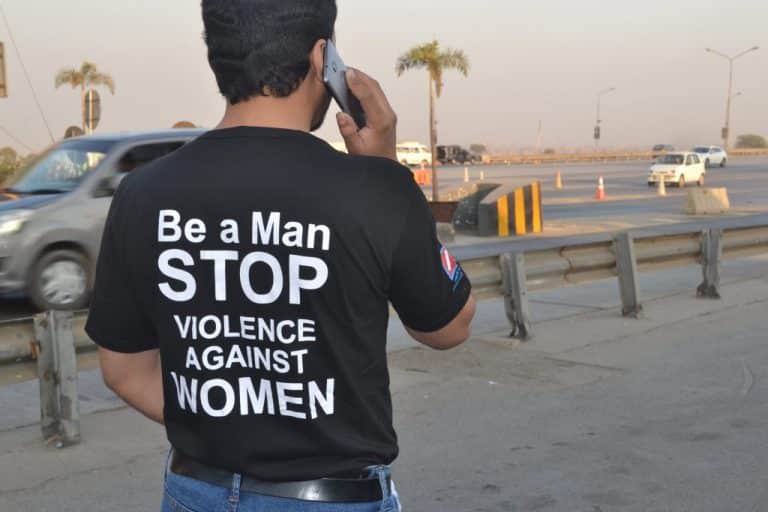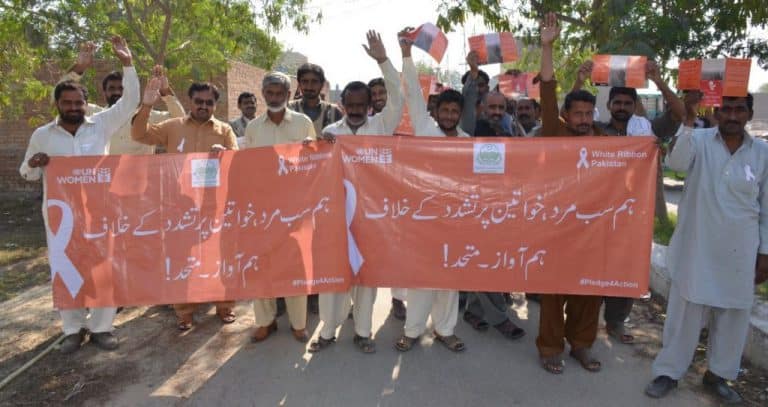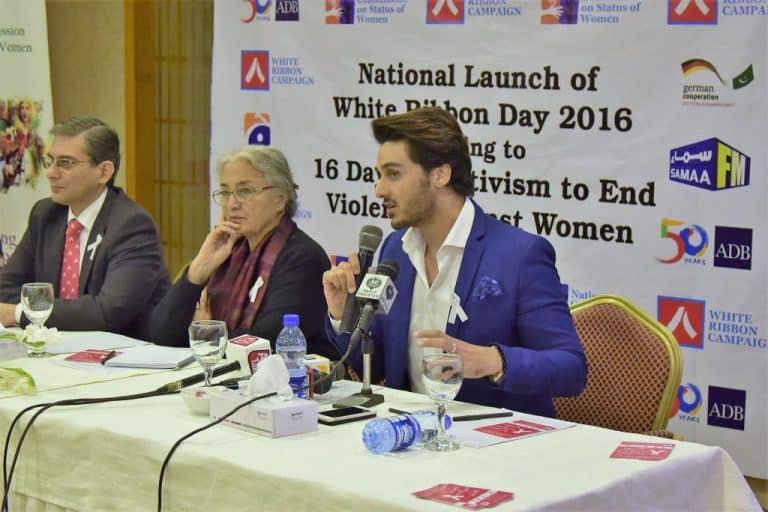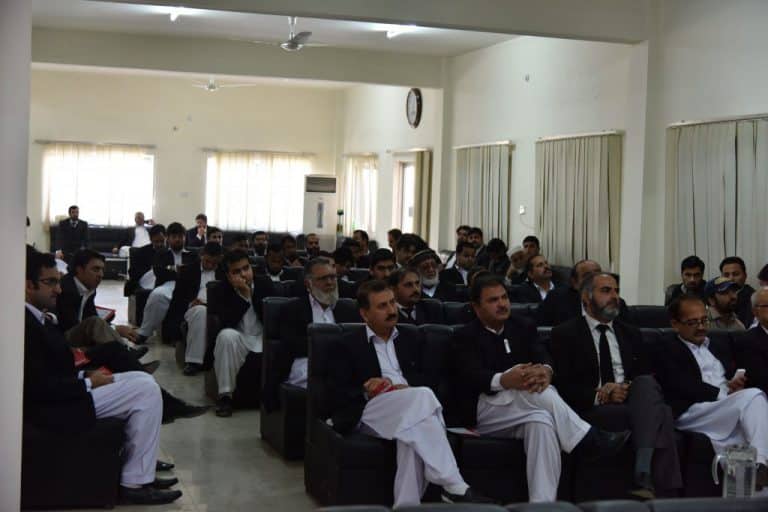
by admin | Oct 25, 2022 | Uncategorized
Practitioners, policy advocates, and researchers have come to an agreement that we must engage men and boys across the individual, community, institutional, and societal levels to end violence against women (VAG). So, it is important to work across different sectors to effect change at different levels of the social ecology.
To bring change at the individual level we must start from the adolescents because in this age boys develop attitudes, gender relations and gender identities. Starting male engagement program at school level and reaching out to young boys at home and playgrounds too is necessary to form their positive attitudes towards opposite gender. We must teach young boys to adopt positive masculinities through well-tested, evidence-based group-work methodologies to form more equitable gender relations.
We must highlight the positive role of men in front of boys for instance caregivers. we must persuade them to be caregiver withing their families and then communities because men’s involvement with their families is an important component of supporting their social reintegration in post-conflict situations. Youth must be taught that social justice is crucial to have a better life so boys and girls have to struggle together to have one.
We are running unique and most effective men engagement program which focuses on fatherhood concept. We have observed that most abusers don’t listen to anyone regarding their behaviour but when it comes to the education of their children they do listen. When we tell them that their violent behaviour can affect the healthy development of their children and they can imitate them now and in future too, this affects more than anything and they start trying to change their violent behaviour for their children.

by admin | Oct 25, 2022 | Uncategorized
To tackle the violence against women and girls, we must ensure community-level prevention and response mechanisms. Evidence shows that the traditions, beliefs, norms and practices that operate within communities are major barriers to women’s access to justice, protection and freedom from violence. Social norms and practices can make it difficult for women to formally report violence and seek justice so, it is crucial to confront these barriers.
Engaging at the community level is essential to improving support to survivors of violence, who tend to turn to the community rather than to formal services. community-level support and referral networks are therefore needed alongside interventions to improve the provision of specialist Violence Against Women and Girls (VAWG) services.
Organizations with initiatives to engage men and boys in preventing violence against women focus on group education, community outreach, mobilization and mass media campaigns to reduce the violence against women and girls. We can use the “gender transformative” approach which challenges rigid gender roles and question the influence of social-cultural, community, and institutional factors as well as individual beliefs and attitudes.
To end the VAW at the community level we have to confront the dominant and harmful norms of masculinity that are viral. Peer pressure is one of the reasons that gender-based violence (GBV) takes place. We must give support to those who are dealing with peer pressure and condemn those who are promoting harmful ideas. If the whole community starts opposing VAW we can use peer pressure to end violence too by social influences and promoting positive norms of masculinity.
Organizing men to undertake action by discussing positive masculinities is effective to make them change their attitudes and behaviors. We must focus on increasing the role of men in responding to the VAW it will encourage other men to do the same and discourage those who are involved in VAW.
We must involve the community and religious leaders to address the harmful traditional practices and ask them to promote reforms and bring change in the community. We can attain a positive change by giving a religious point of view and positive social norms without challenging the patriarchal basis of their authority.

by admin | Oct 25, 2022 | Uncategorized
Individual and community level strategies for change must be complemented by initiatives directed at reforming the institutions that shape people’s lives and affect women’s and girls’ vulnerability to violence and their ability to access needed services.
Women’s movements throughout the world continue to exert pressure for policy change, but programming with men on Gender Based Violence (GBV) prevention has rarely focused on advocating for policy development on such violence. Mobilizing men on issues of GBV and gender equality can make them actively involved in policy advocacy and campaigning.
We must identify and nurture internal champions to facilitate Institutional reforms. initiatives and mainstream gender training can provide the necessary leadership to initiate and sustain institutional reforms. We need to invest sufficient time and resources to train and then mentor the people who can further influence others to bring policies that can reduce the Violence against women and girls. Reforming the policies and ‘cultures’ of male-dominated institutions is an important priority for male engagement programming to end VAWG.
Arranging workshops on women’s rights, gender equality, and institutional responsibilities can be proved effective to bring institutional reforms. We can persuade them to stop Violence Against Women and Girls (WAWG) by sensitizing them about gender socialization, harmful norms of masculinity and best practices. It will motivate them to commit to change institutional culture and practices concerning VAWG.
Another promising and relatively neglected area of work with men on ending VAWG is to address the role that men can play to create a more conducive public environment for efforts to end VAWG. The principle of men holding other men accountable for their patriarchal behavior should be extended to holding male authority figures accountable for their public discourse.

by admin | Oct 25, 2022 | Uncategorized
In recent years, significant progress has been made in Pakistan concerning legislative and policy action on Violence Against Women and Girls (VAWG). But the real problem to be tackled is inadequate funding and implementation of such laws and policies. Men dominate all the institutions, development of policies and laws, implementation and enforcement of laws and the provision of justice all are in control of men. From workplaces to schools to law enforcement and justice systems, these institutions not only tend to be led by men but are often infused with the very patriarchal norms and ‘cultures’ that underpin VAWG So, it is critical to target the men to improve the situation and end the violence.
Justice remains in inaccessible and unresponsive to women and girls because of many reasons. The government, law enforcement agencies and justice officials can play their roles to end the violence.
Male engagement at the societal level is vital for gender equality and social justice. We have to take sustainable actions to challenge inequitable norms and practices of masculinity. Designing and developing interventions requires a movement-building perspective that can contribute fetch change in a community or society. This requires attention to fostering links between organizations and investing in movement-building opportunities, focused only on working with men on positive masculinities and those working on women’s empowerment.
The challenge of ending VAWG is the challenge of changing unequal relations of political, economic, and social power. Supporting the efforts of social movements, which are campaigning for gender justice as part of their social justice work, and targeting male engagement work within such social movements to enlist their support as allies is an important direction for male engagement programming to take.

by admin | Oct 25, 2022 | Uncategorized
Hum Network Limited took the initiative to recognize and honor the contribution and achievements of iconic women from Pakistan and around the world.
Hum Network honored “Omer Aftab” also, The only male champion of change amongst 11 distinguished women. Omer Aftab received the 1st “Lux Hum Women Leadership Award” for his contributions toward social reforms and women empowerment.





